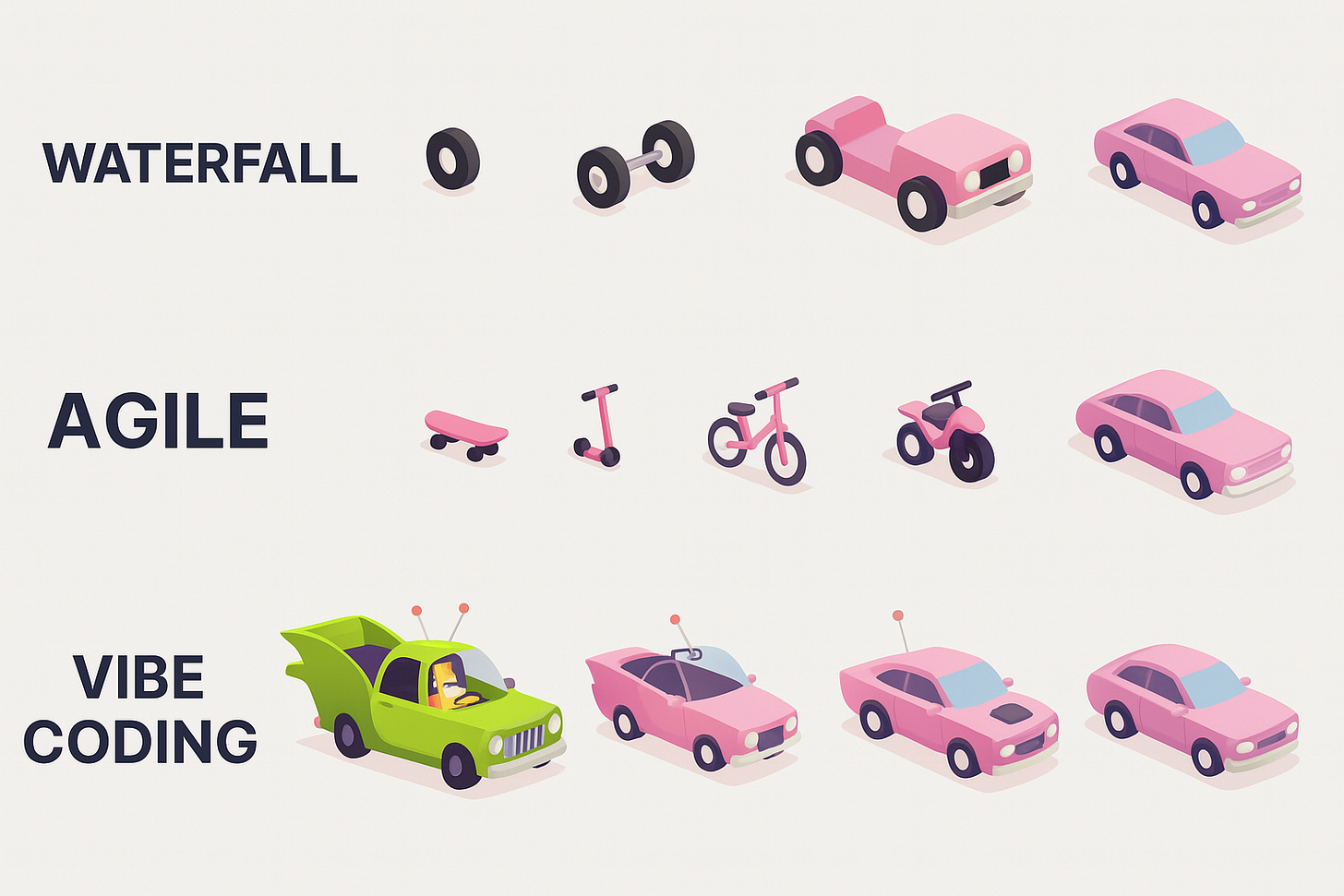Time for "Idea People"
Now it's our turn.
Hey.
Something shifted last week that changed a lot, I thought I knew.
Sam Altman dropped a line that made my heart race: "The idea guys are about to have their day in the sun."
You know what? He's right. And I felt it in my bones because I've been waiting for this moment my entire life.
We lived through different technological breakthroughs: Internet → dot‑com boom → mobile & smartphones → social media → cloud computing → IoT → big data & analytics → blockchain → AI → quantum computing → and more is coming…
Now this isn't just about AI or AI getting better.
This is about a fundamental power shift that most people are entirely missing.
And if you've ever been dismissed as "just having ideas," what I'm about to share might be the most important thing you read this year.
The Cage Is Finally Open
I've always been someone with many ideas, sometimes too many. My usual routine is waking up in the middle of the night, feeling excited, and writing down these ideas. I have a knack for seeing a problem and immediately knowing the solution.
I watch how people struggle and think, "there's a better way." But here's the thing - I couldn't build it. Not alone.
So I'd pitch. I'd beg. I'd search for that mythical "technical partner." And you know what usually happened? Nothing.
Or worse - they'd build something that missed the entire point.
What is the motivation behind the idea? Lost in translation.
The nuance of the platform? Simplified to death.
The vision? Reduced to features.
But that era just came to an end.
In my recent piece on the AI → AGI → ASI progression, I wrote about how "we move quickly" and how "exponential advancements in computational power and algorithmic efficiency have marked the journey from AI to AGI."
But I didn't fully grasp what this meant for people like us until Altman's declaration.
The technical bottleneck that held idea people back for decades just evaporated.
What Everyone's Missing
When people hear "AI will help you build," they think it's about making coding easier.
That's like saying cars are about making walking faster. You're missing the entire paradigm shift.
Here's what's actually happening:
The distance between idea and reality is collapsing
The cost of testing an idea is approaching zero
The person who understands the problem best can now build the solution
Think about that last one. Really think about it.
The person who FEELS the problem most deeply can now solve it.
Not the person who went to coding bootcamp. Not the person with a CS degree. The person who actually gives a damn.
And this isn't wishful thinking. We're watching it happen in real time. $97 billion flowed into AI startups last year. In 2025 alone, 24 companies raised over $100 million each. The money is following the vision, not just the code.
AImplification
In my newsletter on AImplification, I explored how "AI is not just a tool—it's a dynamic partner that is reshaping how we live, work, and innovate." But I was still thinking too small.
AImplification isn't just about making our current work better.
It's about completely redefining what's possible for a single human being.
Here's what I mean:
Traditional Business Building:
Idea → Find technical co-founder → Build MVP → Raise money → Hire team → Scale
AImplified Business Building:
Idea → AI partnership → Instant prototyping → Direct to market → AI-powered scaling
The entire middle layer of traditional startup building - the part that required teams, funding rounds, and technical expertise - is getting compressed into AI capabilities that one person can orchestrate.
The Billion-Dollar One-Person Company
I'm calling it now - we're about to see the first billion-dollar company built by one person.
Not a team. Not a startup. One human with a vision and an army of AI agents.
People don't understand that this isn't about replacing employees. It's about removing the friction between imagination and reality.
Sam Altman predicts that by 2025, we'll see "the first AI agents join the workforce." By 2026? Systems that can "figure out novel insights." By 2027? "Robots that can do tasks in the real world."
But let me paint you a more specific picture of what this looks like:
Morning: Your AI research team analyzes market trends, competitor moves, and customer feedback while you sleep.
Noon: Your AI development team has built and tested three prototypes based on the morning's insights.
Evening: Your AI marketing team has launched personalized campaigns across 47 different channels, optimizing in real-time.
Night: Your AI customer service team handles thousands of interactions, learning and improving your product with each conversation.
You? You're focused on vision, strategy, and the decisions that only a human who truly understands the problem can make.
Think of it like an artist who no longer needs to mix paints. They just think "sunset over mountains" and it appears. But here's the key - knowing what sunset to paint still matters.
That's where idea people win. We've been painting sunsets in our minds forever. Now we finally have the brushes.
Why Your "Weakness" Is Now Your Superpower
You know what idea people have that pure technical people often don't?
Emotional intelligence about problems.
We don't just see that something's broken. We feel WHY it's broken. We understand the human motivation behind the friction. We get the psychology of the solution.
And that's exactly what AI can't do. It can build anything, but it can't feel what needs building.
This cognitive difference isn't a bug - it's your competitive advantage in an AI-powered world. Here's why:
Pattern Recognition vs. Pattern Feeling: Technical people are great at recognizing patterns in data. Idea people feel patterns in human behavior. With AI handling the data analysis, human intuition becomes the differentiator.
Solution Architecture vs. Problem Architecture: Coders architect solutions. Idea people architect problems - we understand the deeper system that needs changing, not just the surface symptom.
Feature Thinking vs. Transformation Thinking: Traditional builders think in features and functions. Idea people think in transformations and outcomes.
In my Circles newsletter, I wrote about ditching traditional job titles because "rigid titles don't capture people's real capabilities." The same principle applies here. The rigid categories of "technical" vs "non-technical" are about to become meaningless.
The Overlooked Truth About Creation
Everyone's talking about how AI democratizes building. But they're missing what actually gets democratized:
The ability to stay true to your vision.
No more committees watering down your idea.
No more developers saying "that's too hard."
No more investors demanding you pivot. No more "that's not technically feasible."
Just you, your vision, and the tools to make it real.
You know what that means? The weird ideas win. The specific solutions win. The things that wouldn't get built because they only serve 10,000 people instead of 10 million - they finally get built.
And those are often the ideas that become billion-dollar companies. Because they solve real problems for real people, not theoretical problems for theoretical markets.
Look at what's getting funded:
Lila Sciences raised $200 million to build "science superintelligence platforms."
Reflection.AI got $130 million for "superintelligent autonomous systems."
These aren't tech companies - they're idea amplification engines.
The market is already betting on vision over code.
The New Startup Playbook
Let me share what I'm seeing work right now, based on my experience building multiple companies and watching this transition happen:
Phase 1: Idea Validation (Week 1)
Use Claude/GPT to research your problem space
Generate user personas and market analysis
Create detailed solution frameworks
Build business model variations
Traditional Time: 3-6 months of customer interviews and market research AI-Amplified Time: 1 week of intensive AI-assisted analysis
Phase 2: Rapid Prototyping (Week 2-3)
Use tools like Cursor, V0, or Bolt.new to build functional prototypes
Test multiple versions with real users
Iterate based on feedback in real-time
Create polished demos for stakeholder validation
Traditional Time: 6-12 months of development cycles AI-Amplified Time: 2-3 weeks from concept to working prototype
Phase 3: Market Entry (Week 4-8)
AI-powered content creation for all marketing channels
Automated customer acquisition systems
Real-time optimization of messaging and positioning
Direct customer feedback integration
Traditional Time: 12-18 months to find product-market fit AI-Amplified Time: 1-2 months of intensive market testing
Phase 4: Scaling Without Traditional Infrastructure (Month 3+)
AI agents handling customer service
Automated business operations
Predictive analytics for all business decisions
Continuous product improvement based on usage data
Traditional Requirements: Team of 50+ people, multiple funding rounds AI-Amplified Requirements: Solo founder + AI infrastructure
The Motivation Factor
Here's what really separates idea people from everyone else, and why this moment belongs to us:
We're motivated by the problem, not the solution.
We don't want to build apps. We want to eliminate friction. We don't want to start companies. We want to create change. We don't want to code. We want to craft better realities.
And now, finally, the tools match our motivation.
In my Agency Building Playbook, I wrote about how "the old tricks are losing their punch" in traditional marketing.
The same thing is happening in traditional business building. The old playbook of finding technical co-founders, raising seed rounds, and building teams is becoming obsolete.
The new playbook is: Have a vision. Use AI. Ship fast. Scale infinitely.
The Overlooked Advantages of Idea People
What technical people built over decades was impressive: the internet, mobile computing, social platforms. But they also built these things with technical constraints in mind.
Idea people don't have those constraints in our thinking. We imagine solutions without worrying about implementation complexity. That "weakness" is about to become our greatest strength.
Here's what we naturally do that becomes super-valuable:
Systems Thinking: We see how changing one thing affects everything else. Perfect for designing AI workflows.
User Empathy: We understand pain points at an emotional level. Perfect for creating AI that actually helps people.
Vision Clarity: We can articulate desired outcomes without getting lost in process. Perfect for directing AI agents.
Rapid Iteration: We're used to pivoting based on feedback. Perfect for AI-assisted rapid prototyping.
Cross-Domain Connection: We see solutions from one field that apply to another. Perfect for leveraging AI across multiple domains.
The Meta-Opportunity
But here's the really big picture that most people are missing:
This isn't just about using AI to build your ideas faster. This is about becoming an AI orchestrator.
The most successful "idea people" in the next decade won't just use AI tools. They'll become AI conductors, orchestrating multiple AI systems to create outcomes that no single human or AI could achieve alone.
Think about it:
AI for market research and validation
AI for product development and testing
AI for marketing and customer acquisition
AI for operations and customer service
AI for financial analysis and business intelligence
But someone needs to conduct this orchestra. Someone needs to ensure all these AI systems are working toward a coherent vision. Someone needs to make the human decisions about what problems are worth solving.
That someone is the idea person.
Move now or never
I'm not going to give you a complex framework. You don't need one.
Here's what you do:
This Weekend:
Pick the problem that's been bothering you for years
Open Claude or GPT and spend 4 hours mapping out your solution
Use Cursor or V0 to build a basic version
Share it with 10 people who have the same problem
Document everything - your journey becomes your story
This Month:
Iterate based on feedback using AI assistance
Create automated systems for the parts you don't want to do manually
Start building your AI workforce for specific tasks
Connect with other idea people making this transition
This Year:
Launch, scale, and optimize using AI amplification
Remember: companies are going from zero to $100M+ valuations in months
Speed and vision are your allies
Think exponentially, not incrementally
That's it. That's the entire playbook.
No accelerators. No pitch decks. No begging for permission.
Just build what you've been dreaming about.
The Future Belongs to the Motivated
The technical people had their era. They built the infrastructure. They created the foundation. And we should thank them.
But now?
Now it's time for the people who know WHY to build, not just HOW. Now it's time for the people who see what's missing, not just what's possible. Now it's time for the people who feel problems deeply and dream solutions boldly.
Now it's time for idea people.
Our time.
The cage is open. The tools are ready. The market is waiting.
What are you going to build?
Post-credit scene
You have a golden opportunity. Don’t waste it. Let's build something meaningful.
Foundational Reading
"The Lean Startup" by Eric Ries - Now 10x more relevant with AI
"Zero to One" by Peter Thiel - Creating new things vs copying
Paul Graham's Essays - Especially "How to Get Startup Ideas"
🎙️ Podcasts to Fuel Your Fire
Sam Altman on the Lex Fridman Podcast - The full conversation that sparked this revolution
Reid Hoffman's Masters of Scale - How big ideas actually scale
How I Built This - Founders who started with just an idea
The All-In Podcast - Where the AI funding trends get discussed
🛠️ Your AI-Powered Building Arsenal
For Ideation & Research:
Claude - Your AI thought partner for deep problem analysis
ChatGPT - Rapid brainstorming and concept development
Perplexity - Real-time market research and trend analysis
For Building & Prototyping:
Cursor - Where ideas become code with AI assistance
V0 by Vercel - Design to deployment in minutes
Bolt.new - Full apps from natural language descriptions
Replit - Collaborative coding with AI pair programming
For Design & User Experience:
Figma with AI plugins - AI-assisted design workflows
Midjourney - Visual concepts and branding
Adobe Firefly - Integrated creative AI tools
For Marketing & Growth:
Copy.ai - AI-powered content creation
Jasper - Marketing copy and campaign development
Runway - AI video creation for marketing
For Business Operations:
Zapier - Automated workflows between tools
Motion - AI-powered project management
Notion AI - Intelligent documentation and planning
💡 Weekend Project Ideas That Could Become Billion-Dollar Companies
Personal Pain Points:
A tool that solves your daily annoyance (the best ideas start here)
An app that automates something you do manually every week
A solution to a problem you've explained to friends 10 times
Market Opportunities:
A marketplace for something only you've noticed people need
A service that combines two existing tools in a way that creates 10x value
A platform that serves an underserved niche you understand deeply
AI-Native Ideas:
A business that only becomes possible with AI (think beyond automating existing processes)
A solution that gets better with more users (network effects + AI learning)
A tool that turns non-experts into experts using AI guidance
📊 Track the Money & Trends
Funding Intelligence:
Crunchbase AI Funding - See where the billions are flowing
TechCrunch AI Coverage - Daily funding updates
CB Insights AI Report - Quarterly trend analysis
Market Intelligence:
ProductHunt AI Collection - See what's launching daily
AI Twitter/X Lists - Follow the builders and investors
Y Combinator AI Companies - Track the accelerator pipeline
Remember: The best ideas come from your own experience. What problem do you face that nobody's solving properly? What frustration do you deal with that could be someone else's billion-dollar opportunity?
The question isn't whether you have good ideas. The question is whether you'll finally build them.
What idea have you been sitting on? Reply and tell me. Sometimes we just need someone to say "build it."
Thanks for reading.
Vlad





